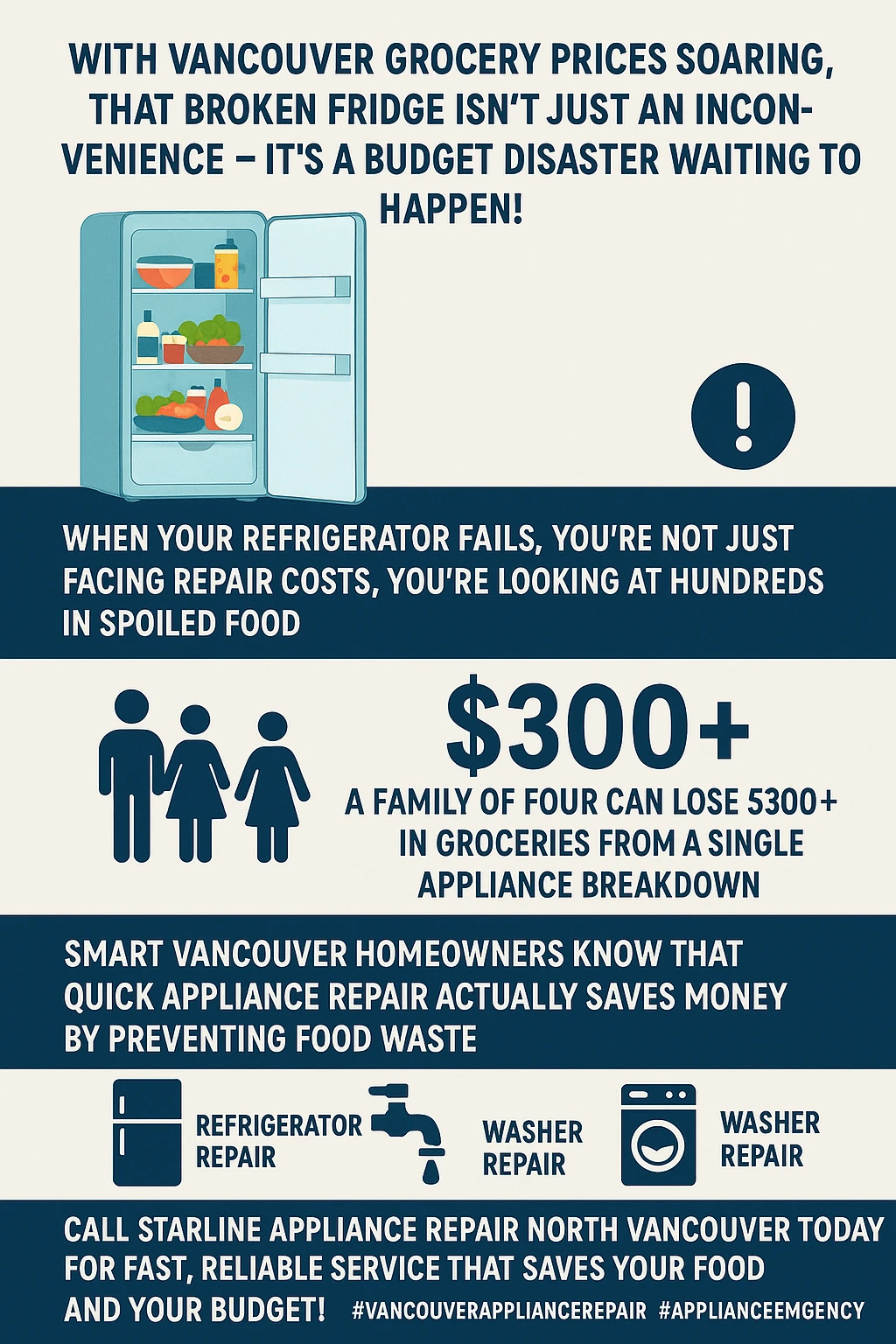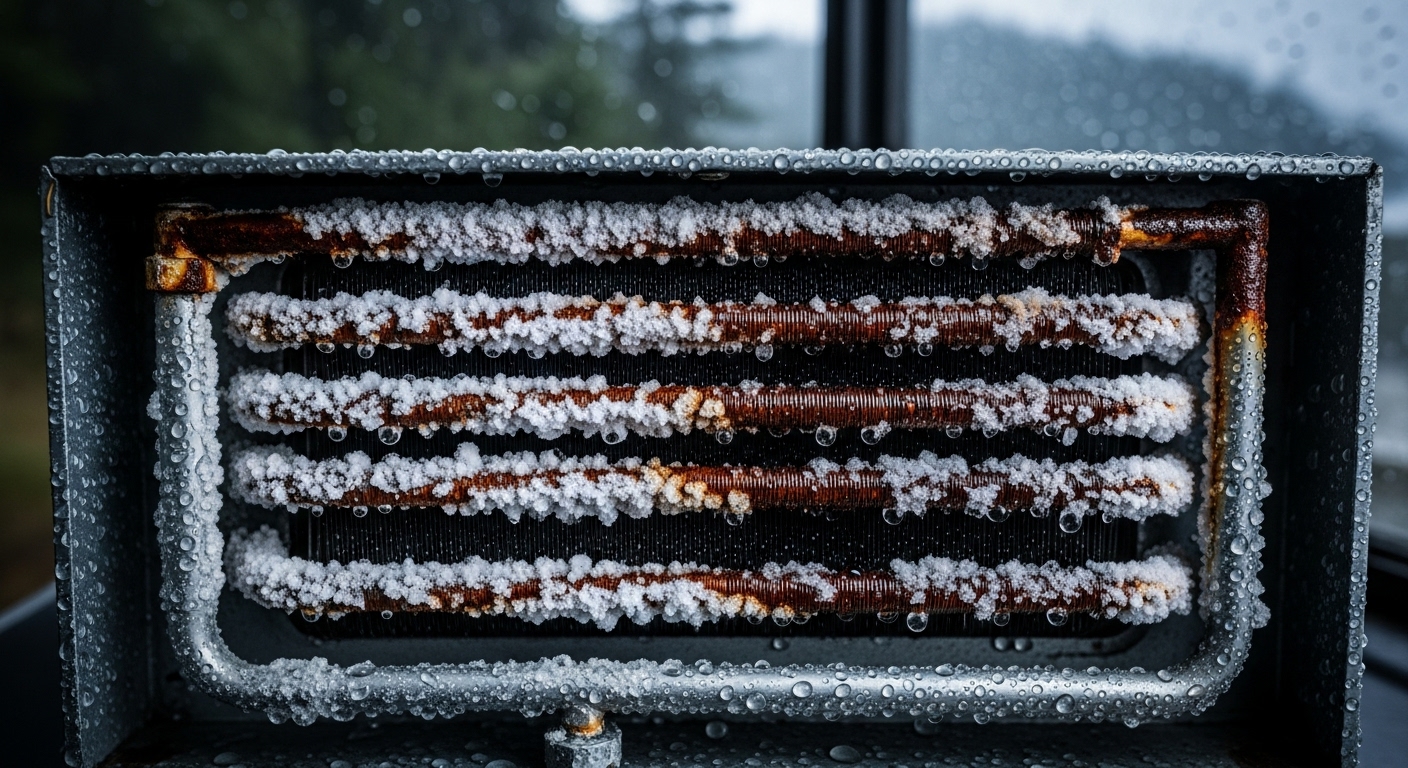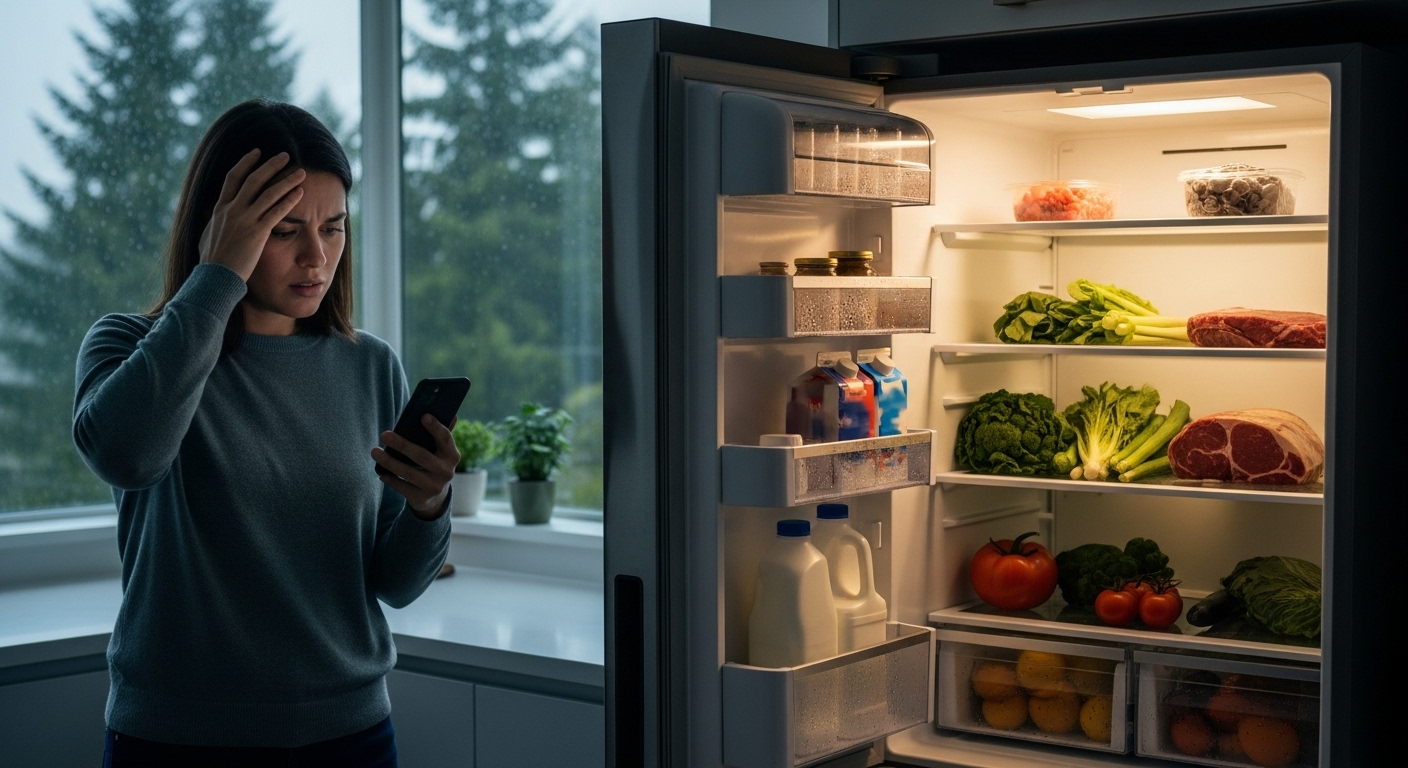How Vancouver’s Rising Food Costs Are Making Broken Appliances More Expensive Than You Think: The Hidden Connection Between Food Waste and Appliance Repair
Picture this: your trusty refrigerator decides to call it quits on a Sunday evening, right after you’ve dropped $400 on groceries for the week. What’s the real damage to your wallet when Vancouver food costs are hitting record highs?
Let me paint you a picture that’s becoming way too familiar for Vancouver homeowners. You’re standing in your kitchen at 7 AM, coffee mug in hand, when you realize something’s off. Your fridge is making that weird grinding noise again, but this time it’s accompanied by an eerie silence where the usual hum should be. Your heart sinks as you open the door and feel lukewarm air instead of that crisp chill.
Now here’s where things get really painful. While you’re frantically googling “emergency appliance repair Vancouver,” that $400 worth of groceries you picked up yesterday is slowly climbing toward the danger zone. In Vancouver’s current economic climate, where families are expected to spend an extra $801 on food this year alone, a broken appliance isn’t just an inconvenience – it’s a financial double whammy that can seriously dent your budget.
This isn’t just about the cost of fixing a broken appliance anymore. We’re living in an era where every pound of spoiled meat, every carton of soured milk, and every bag of wilted vegetables represents a much bigger hit to your wallet than it did even two years ago. The connection between Vancouver’s soaring food costs and appliance reliability has created a perfect storm that’s catching homeowners off guard.
Key Outtakes:
- Vancouver families face an $801 annual food cost increase in 2025, making appliance failures more financially devastating than ever
- A single refrigerator breakdown can cost homeowners $500-1,500 in repairs plus $200-800 in spoiled food within 48 hours
- Vancouver’s coastal climate accelerates appliance wear, requiring proactive maintenance to prevent costly emergency repairs
- Most home insurance policies provide limited food spoilage coverage ($1,000-2,000), leaving homeowners vulnerable to significant losses
- Strategic appliance maintenance can prevent 85% of common failures while protecting against rising food replacement costs

The Rising Cost of Food Waste When Appliances Fail
Here’s something that’ll make your wallet weep: the timing of appliance failures has never been worse from a financial perspective. Vancouver families are already bracing for food costs that will hit $16,833.67 for a family of four in 2025 – that’s an eye-watering increase of over $800 compared to last year. When your fridge decides to give up the ghost in this economic climate, you’re not just dealing with a repair bill; you’re potentially watching hundreds of dollars worth of groceries turn into expensive compost.

Let’s break down what’s actually at stake when disaster strikes. The average Vancouver family keeps about $300-500 worth of food in their refrigerator and freezer at any given time – and that’s using pre-inflation values. With meat prices expected to jump 4-6% this year and vegetables climbing 3-5%, those numbers are only going higher. When Canadian households already waste approximately $600-1,800 worth of food annually under normal circumstances, an appliance failure can instantly push a family into the higher end of that range in a single weekend.
The cruel irony is that appliance failures never seem to happen at convenient times. Your dishwasher doesn’t politely schedule its breakdown for when you’ve just finished your groceries. No, it waits until you’ve stocked up for a dinner party, loaded up on sale items, or just completed your monthly Costco run. In Vancouver’s current market, where every grocery trip feels like a small investment, this timing couldn’t be worse.
What makes this situation particularly brutal is the time-sensitive nature of the decision-making process. Unlike other home repairs where you can take your time to shop around for quotes, appliance failures involving refrigeration create an immediate countdown timer. Every hour you spend researching repair companies or debating whether to fix or replace is another hour of rising temperatures and declining food quality. It’s like watching your money literally evaporate in real-time.
The psychological impact is real too. When you’re already stretching your budget to accommodate Vancouver’s inflated grocery bills, losing a fridge full of food feels like a punch to the gut. It’s not just the financial loss; it’s the frustration of careful meal planning and budget management going down the drain. Many families find themselves eating out more during appliance repairs, adding insult to injury when they’re already dealing with higher restaurant prices across the city.
Vancouver’s Climate Challenge: Why Your Appliances Are Working Harder
Now, before we dive deeper into the cost analysis, there’s something every Vancouver homeowner needs to understand about why our appliances seem to give up more frequently than those in other cities. Living in this beautiful coastal paradise comes with hidden costs that extend far beyond our notoriously expensive real estate market – our appliances are literally fighting an uphill battle against the elements every single day.

Vancouver’s coastal location means our appliances are constantly exposed to salt air, which acts like a slow-motion wrecking ball on metal components. Even if you live in Burnaby or Richmond, those salt particles travel surprisingly far inland, especially during winter storms. Vancouver appliance technicians regularly find salt corrosion on refrigerator coils in homes that aren’t anywhere near the waterfront. It’s like your appliances are slowly being pickled from the inside out.
The humidity situation is another silent appliance killer. Our damp winters create the perfect breeding ground for mold and mildew, particularly in front-loading washing machines where rubber door seals become prime real estate for gross, smelly growth. But it’s not just about aesthetics – this moisture wreaks havoc on seals, gaskets, and plastic components through constant thermal cycling. Your appliances expand and contract with temperature changes far more dramatically than they would in a dry climate, leading to premature wear and unexpected failures.
Temperature swings might not seem dramatic to us humans, but for appliances, Vancouver’s weather patterns create a constant stress test. During our notorious “rainy season that never ends” periods, followed by those surprise sunny spells, your appliances are working overtime to maintain consistent performance. Refrigerators struggle harder to maintain cool temperatures when the ambient humidity is high, dishwashers have to work extra cycles to actually get things dry, and dryers take longer to do their job – all of which shortens their lifespan.
What’s particularly sneaky about Vancouver’s climate challenges is that the damage accumulates gradually. Unlike a dramatic failure where a part obviously breaks, salt air and humidity cause slow degradation that often goes unnoticed until it’s too late. Door seals on refrigerators and washing machines fail more frequently here than in drier climates. Power fluctuations during our winter storm season stress electronic components. Even our infamous power outages, while brief, force appliances to restart repeatedly, which is harder on motors and electronic controls than steady operation.
This climate reality means Vancouver homeowners need to think differently about appliance maintenance and replacement schedules. The manufacturer’s suggested maintenance intervals? They’re based on ideal conditions that simply don’t exist in our corner of the world. The eight to ten-year lifespan estimates for major appliances? Cut those down by about 20% if you want to be realistic about Vancouver conditions. Understanding this climate factor is crucial because it directly impacts both your maintenance costs and the frequency of those expensive emergency repairs that coincidentally happen when your fridge is fully stocked.
The Real Cost Analysis: Repair vs. Replace vs. Food Loss
Alright, let’s talk numbers – and I mean the kind of real-world math that actually helps you make smart decisions when you’re staring at a dead appliance and a fridge full of groceries. Understanding the true cost breakdown of appliance failures in Vancouver’s current economic climate can mean the difference between making a financially sound decision and throwing money down the drain.

First, let’s establish the baseline repair costs you’re looking at in Vancouver. appliance repair costs in Vancouver are already higher than in many other Canadian cities due to a combination of high operational costs for businesses (we see you, commercial rent) and a shortage of qualified technicians. Here’s a quick breakdown:
- Service Call Fee: Expect to pay $100-$150 just for a technician to show up, diagnose the problem, and give you a quote. This fee is usually waived if you proceed with the repair.
- Common Refrigerator Repairs: A failed thermostat or a broken fan motor can set you back $250-$450. A more serious issue like a compressor replacement? You’re looking at $500-$1,200, at which point you’re in replacement territory.
- Dishwasher & Washing Machine Repairs: Issues with pumps, motors, or control boards typically range from $300-$600.
Now, let’s factor in the food loss. According to the FDA, food in a refrigerator is only safe for about 4 hours without power. A full freezer can hold its temperature for about 48 hours. If your repair technician can’t get to you within that window (a common scenario on weekends or holidays), you could be looking at a total loss. Let’s do the painful math:
- Scenario 1: The Quick Fix. Your fridge breaks on a Tuesday morning. You get a technician out by the afternoon. The repair is a simple thermostat swap ($300). You lose maybe $50 in highly perishable items. Total cost: $350.
- Scenario 2: The Weekend Catastrophe. Your freezer dies on a Friday night. You can’t get anyone until Monday morning. You lose the entire $400 worth of groceries you just bought. The repair is a compressor issue, costing $800. Total cost: $1,200.
This is where the financial pressure becomes immense. Do you gamble on a $1,200 repair for a ten-year-old appliance, or do you bite the bullet and buy a new one for $2,000, all while you’re out $400 in groceries? These are the real-time decisions Vancouver homeowners are facing, and the stakes have never been higher.
Is Your Home Insurance a Safety Net? Don’t Be So Sure.
At this point, you might be thinking, “Well, at least my home insurance will cover the spoiled food, right?” The answer, unfortunately, is a big, fat “maybe.” While most standard home insurance policies in British Columbia offer some coverage for food spoilage due to appliance failure, the devil is in the details.

Here’s what you need to know before you start celebrating. Most policies have a specific limit for food spoilage, typically ranging from $1,000 to $2,000. While that might have been sufficient five years ago, with today’s food prices, a fully stocked freezer could easily exceed that limit. A Costco run for a family of four can easily top $500-700 these days – lose that, plus the contents of your fridge, and you’re pushing the boundaries of your coverage fast.
Then there’s the deductible. Your home insurance deductible could be anywhere from $500 to $2,500. If your deductible is $1,000 and you lose $1,200 worth of food, you’re only getting $200 back from the insurance company. For many homeowners, it’s not even worth filing a claim and risking an increase in their premiums for such a small payout. You end up absorbing the loss yourself.
Finally, there’s the “cause of failure” clause. Insurance policies are notoriously specific. They’ll cover spoilage from a sudden and accidental mechanical breakdown, but they won’t cover failures due to age, lack of maintenance, or general wear and tear. If the technician’s report says your 15-year-old fridge simply died of old age, your claim could be denied. This is where Vancouver’s climate comes back to bite you – what you might see as a sudden failure, your insurance company could argue is accelerated wear and tear from our coastal conditions, which they may not cover.
The bottom line is that relying on home insurance as your primary safety net is a risky gamble. It’s a last resort, not a get-out-of-jail-free card. The most effective financial strategy is to prevent the failure in the first place.
The Proactive Approach: How Regular Maintenance Saves You Money on Groceries
If the thought of throwing out $500 worth of organic chicken and farmers’ market vegetables makes you physically ill, then it’s time to shift your mindset from reactive repair to proactive maintenance. Think of it as cheap insurance for your grocery budget. A small investment in regular appliance check-ups can prevent the catastrophic failures that lead to both a hefty repair bill and a heartbreakingly expensive trip to the grocery store to restock.

What does proactive maintenance actually look like for a Vancouver homeowner? It’s simpler than you think:
- Clean Your Coils: This is the single most important thing you can do for your refrigerator. In Vancouver, dust, pet hair, and salt particles can create a thick, insulating blanket on your condenser coils, forcing your fridge to work much harder to stay cool. Cleaning them twice a year can improve efficiency by up to 30% and significantly reduce the strain on the compressor – the most expensive part to replace.
- Check Your Seals: The humid Vancouver climate is brutal on the rubber gaskets around your fridge and freezer doors. A tiny tear or a warped seal lets cold air escape and humid air in, leading to frost buildup and a constantly running compressor. Do the “dollar bill test”: close the door on a bill. If you can pull it out easily, your seal needs replacing.
- Descale Your Dishwasher and Washing Machine: While our water isn’t as hard as in other parts of Canada, mineral buildup is still a problem. Running a descaling agent through your dishwasher and washing machine every few months prevents clogs in the pipes and keeps them running efficiently.
- Clear Your Dryer Vent: This is a fire hazard first and foremost, but a clogged dryer vent also makes your dryer work much harder, leading to premature failure of the heating element.
Investing in an annual professional maintenance check-up is one of the smartest financial moves a Vancouver homeowner can make in this economy. For about the cost of a single service call fee, a technician can spot potential issues like a worn-out fan motor or a struggling capacitor before they lead to a complete system failure. They can identify the subtle signs of corrosion from our salt air and take preventative measures. It’s the difference between replacing a $50 part during a scheduled visit and paying for a $500 emergency repair on a Saturday night while your ice cream melts.
FAQs: Navigating Appliance Failures and Food Spoilage
- How long is food safe in a broken fridge? The general rule is 4 hours for a refrigerator. A half-full freezer will keep food frozen for about 24 hours, and a full freezer for about 48 hours, as long as you keep the door closed.
- Should I repair or replace my appliance? A good rule of thumb is the 50% rule. If the cost of the repair is more than 50% of the cost of a new appliance, and the appliance is more than halfway through its expected lifespan, it’s usually more cost-effective to replace it.
- Can I claim food loss on my taxes? Unfortunately, no. Food spoilage due to an appliance failure is not a tax-deductible loss in Canada.
- What’s the best way to find a reliable appliance repair technician in Vancouver? Look for companies with a strong local presence, positive Google reviews that mention specific technicians by name, and clear pricing policies. Avoid any company that isn’t transparent about their service call fee upfront.
- How can I protect my food if my fridge breaks? If you can, get coolers and ice immediately. Cook any meat that’s in danger of spoiling. Ask a neighbour if you can borrow some space in their freezer for high-value items.
Wrapping Up: Protecting Your Wallet and Your Peace of Mind
The link between a functioning appliance and your grocery budget has never been more direct or more critical for Vancouver homeowners. In an era where every dollar counts and food costs are on a seemingly endless upward trajectory, a broken refrigerator or freezer isn’t just an inconvenience – it’s a significant financial setback. The silent killers of our coastal climate – salt air and humidity – are working against your appliances 24/7, making proactive maintenance not a luxury, but a necessity.
Don’t wait for the hum of your refrigerator to be replaced by a deafening silence. By taking a proactive approach to appliance care, you’re not just extending the life of your machines; you’re actively protecting one of your biggest monthly investments: your food. In the face of Vancouver’s rising costs, a little bit of maintenance can save you a whole lot of money and stress.

